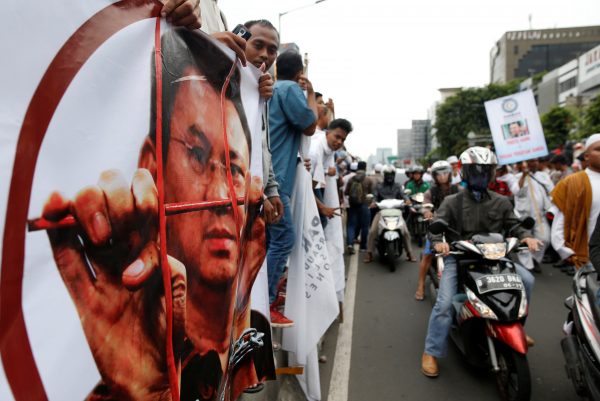This local election should have been an ordinary and straightforward one — just over six months ago, Ahok was widely expected to win with most polls showing a guaranteed first round victory. But as is the case with all things related to Ahok, this election is not only out of the ordinary — it has become one of the most controversial, widely covered and agenda-defining elections in contemporary Indonesian history.
As an ethnic Chinese and a Christian, Ahok is a ‘double minority’ in a Muslim majority country where the ethnic Chinese have been subject to racism since Dutch colonial times. The fact that Ahok could rise to the position of governor of Jakarta (taking over when former governor Joko ‘Jokowi’ Widodo was elected president) is remarkable, particularly considering that throughout Suharto’s New Order regime, Chinese Indonesians were practically absent from politics.
Along with Jokowi, Ahok has come to represent a new breed of hard-working politicians of humble origins who challenge the corrupt and inefficient political establishment. A straight-shooting and media-savvy governor, Ahok implemented tough bureaucratic reforms and clean-up policies intended to fix Jakarta’s crippling corruption, traffic jams and seasonal flooding problems. In the process, he made many enemies and became no stranger to controversy. But Ahok’s confidence and devil-may-care attitude earned him many supporters in Jakarta and around Indonesia. Even those who disliked his style generally still acknowledged his track record.
But all this changed when, in October last year, an edited video of Ahok telling a small crowd not to be ‘fooled’ by those who use the Al-Maidah verse of the Quran to prevent Muslims from electing a non-Muslim leader went viral on social media. Many Muslim voters were deeply offended by Ahok’s comment. For Ahok’s political opponents, the Al-Maidah scandal presented a golden opportunity to attack not just Ahok, but also his political backers, including his close ally Jokowi.
Massive street protests followed, organised by hard-line Islamist organisations such as the Islamic Defenders’ Front (FPI) who opportunistically used the public outrage to push for greater Islamic influence in Indonesian politics. The protests and outcry placed enormous pressure on the national government, and Ahok was quickly charged with blasphemy.
Arguably, the most successful and dangerous aspect of the anti-Ahok campaign has been the reductionist and divisive rhetoric — that a vote for Ahok is a vote against Islam. Likewise, the Jakarta election has been widely portrayed and analysed as an ideological battleground between Islamic piety and pluralism. Policies and track records count for little.
Equally disturbing are attacks aimed at Ahok’s ethnicity. While Ahok was the subject of anti-Chinese attacks early in his career, the intensity of fake news and hate-speech during this election has been alarming. Many of the hoaxes alleged Chinese economic and political conspiracies, not only behind Ahok, but also Jokowi — himself no stranger to anti-Chinese smear campaigns.
For instance, fake news circulated anonymously on social media claimed that Ahok’s free HPV (Human Papillomavirus) vaccine program could make girls infertile, and was part of a greater Chinese conspiracy to diminish the native Indonesian population. Others alleged that both Jokowi and Ahok are agents of communist China. Understandably, the circulation of this anti-Chinese sentiment has worried many Chinese Indonesians.
Evidently, amplifying and politicising the blasphemy allegations has had a significant effect. Most recent polls suggest that Ahok and Baswedan are neck and neck. Baswedan has played a dangerous game in attempting to appeal to conservative Muslim voters, even going so far as to meet with the FPI in a move that shocked those who had seen him as a moderate Muslim politician. Considering that the FPI is widely viewed as a vigilante group, Baswedan’s nod must be seen as a dangerous gesture by a politician who could potentially be Jakarta’s next governor.
In many ways, this election has become much bigger than Ahok. No matter who comes out on top, the real winners are the hard-line Islamists who have manipulated the momentum against Ahok to increase their political influence, particularly over disenchanted Muslims.
Observers have commented that the Jakarta election has become a litmus test for religious tolerance and pluralism in Indonesia. Since Jakarta is also a trendsetter for the rest of the country, this election also sets the stage for the presidential election in 2019. One thing that has become apparent is that the successful use of xenophobic, intolerant and divisive rhetoric can reignite old prejudices and rouse populist sentiments.
Charlotte Setijadi is Visiting Fellow at the Indonesia Studies Programme, ISEAS-Yusof Ishak Institute.

